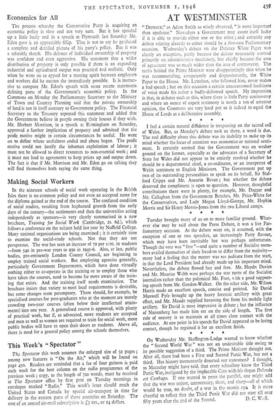Making Social Workers
In the nineteen schools of social work operating in the British Isles there is no common policy and not even an accepted name for the diploma gained at the end of the course. The confused condition of social studies, resulting from haphazard growth from the early days of the century—the settlements and then the universities acting independently as sponsors—is very clearly summarised in a new brochure, Training for Social Work (Cambridge, 2s. 6d.), which follows a conference on the subject held last year by Nuffield College. Many national organisations are being examined ; it is certainly time to examine the social-study schools. Not that they are not prosperous. The war has seen an increase of 70 per cent. in students —from 540 in pre-war years to 93o in 1945-6. Also, at last, public bodies, pre-eminently London County Council, are beginning to employ trained social workers. But employing agencies generally, particularly Government Departments, which have done virtually nothing either to co-operate in the training or to employ those who have taken the courses, need to become far more aware of the train- ing that exists. And the training itself needs examination. The brochure insists that variety to meet local requirements is desirable, but some changes seem peremptory. There should, for example, be specialised courses for post-graduates who at the moment are merely crowding two-year courses (often below their intellectual attain- ments) into one year. A generalised course is approved, with plenty of practical work, but if, as advocated, more students are accepted and men as well as women are required to train for social work, more public bodies will have to open their doors to students. Above all, there is need for a general policy among the schools themselves.


































 Previous page
Previous page